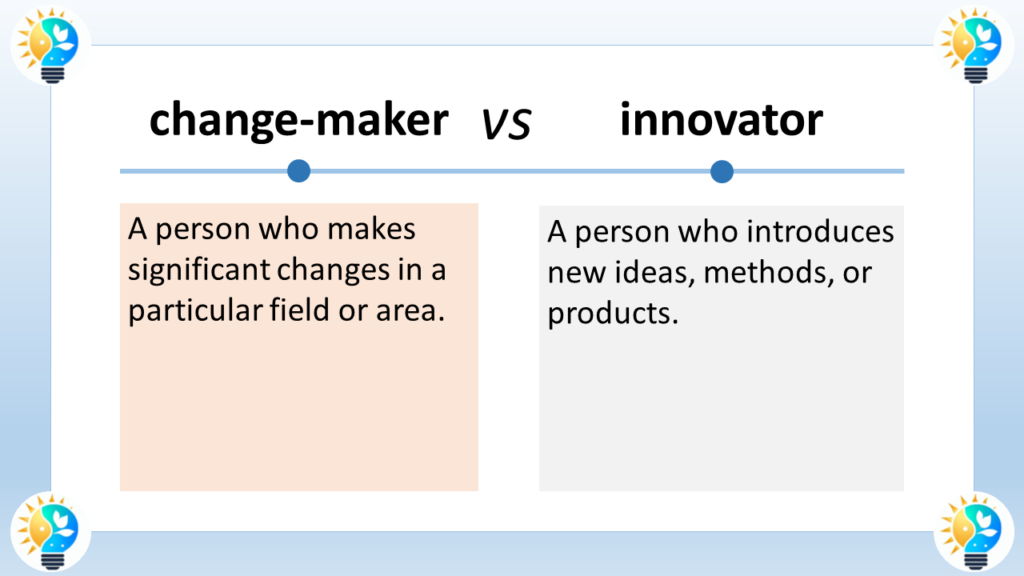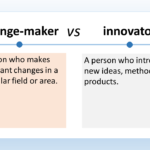An innovator is someone who introduces new ideas, methods, or products, often with added value or improvement over what already exists.
A change-maker is someone who actively works to bring about significant changes, whether it’s in policies, systems, or social norms, often with a focus on creating positive impacts or addressing societal issues.

In the realm of progress and development, the terms Innovator and Change-maker are often used to describe individuals or entities that contribute to social and technological advancement. While they share similarities in driving progress, they embody different approaches and impacts.
Definition
Defining an Innovator
An Innovator is someone who introduces new ideas or methods, especially in the field of technology or business. Innovators are often associated with the creation of new products, services, or processes that improve upon what currently exists.
Characteristics of an Innovator
- Creativity: Exhibits original thinking and develops novel solutions.
- Technical Focus: Often centers on technological or process-oriented advancements.
- Market Influence: Shapes industries by introducing new ways of doing things.
Defining a Change-maker
A Change-maker, on the other hand, is an individual or group primarily focused on creating positive social change. These are people who strive to alter societal norms, address social issues, or influence behavior on a broad scale.
Characteristics of a Change-maker
- Social Impact: Aims to generate significant shifts in societal behavior or norms.
- Leadership: Inspires and leads others towards a collective goal.
- Long-term Vision: Looks beyond immediate effects to the broader implications of their actions.
Synonyms of Innovators
- Change-maker: An individual who actively contributes to positive and transformative changes, often in social or environmental contexts.
- Creator: An individual who brings something into existence, whether it be a product, work of art, or concept.
- Entrepreneur: A person who organizes and operates a business, taking on financial risks in the pursuit of new opportunities and innovation.
- Groundbreaker: An individual who introduces new ideas, methods, or technologies, breaking new ground and paving the way for advancements.
- Inventor: Someone who devises and develops a new product, process, or device, typically through creativity and ingenuity.
- Initiator: Someone who starts or sets a process or series of events in motion, often with the aim of achieving a specific goal.
- Instigator: Someone who initiates or provokes a particular action or event, often with the intention of inspiring change.
- Leader: A person who guides or directs others, often by setting an example and inspiring them to achieve common goals.
- Originator: The person who first brings a new concept, idea, or creation into existence.
- Pioneer: Someone who is among the first to explore or settle in a new area, and metaphorically, someone who is at the forefront of new developments or ideas.
- Prodigy: A person, especially a young one, with exceptional abilities or talents in a particular field.
- Progressive: Someone who supports or advocates for innovation, reform, and progress, often in social or political contexts.
- Reformist: A person who advocates for and works towards making gradual improvements or changes, especially in social, political, or economic systems.
- Revolutionary: A person who advocates or supports a significant and radical change, especially in politics or social structures.
- Trailblazer: A person who is a pioneer or innovator, leading the way in a particular field or activity, often creating a path for others to follow.
- Trendsetter: A person or entity that establishes or popularizes a new trend or style, influencing others to follow suit.
- Visionary: Someone with an exceptional ability to imagine or plan the future, often with innovative ideas or insights that go beyond current norms.

Innovation is considered as a driving force in progress.
It includes the introduction of novel ideas, methods, or products that bring positive change and advancement.
For more information about innovations, check our glossary
Innovator vs. Change-maker: Relationship and Relevance
While Innovators can be Change-makers, and vice versa, the key difference lies in their primary focus. Innovators are often driven by the pursuit of novel and more efficient solutions, which may or may not lead to broader social change. Change-makers are defined by their commitment to societal transformation, whether through innovation, activism, policy, or thought leadership.
Based on the search results, the key differences between an innovator and a change-maker are:
Innovators primarily focus on technological or product advancements, while change-makers are dedicated to driving social and systemic transformations for the greater good.[4]
Innovators are more about “making it different” or “making it new”, with a mindset of moving towards a desired state. Change-makers have a “make it stop” or “make it better” mindset, working to remove constraints and break patterns of ongoing issues.[3]
Innovation is about creating new ideas and methods, while change-making is about applying those innovations to solve social problems and create positive change.[1][2]
In summary, innovators are focused on new technologies and products, while change-makers use innovation to address social challenges and drive meaningful, lasting change for the benefit of society.[4][3]
Contextual Use of the Terms
An Innovator might disrupt the smartphone industry by developing a new type of battery that significantly extends the device’s life. A Change-maker might launch a campaign to promote digital literacy in underserved communities, thereby changing how technology is accessed and used by different segments of society.
Examples of Utilization
Steve Jobs is often cited as an Innovator for his role in creating groundbreaking products and reshaping multiple technology markets. Malala Yousafzai exemplifies a Change-maker through her advocacy for girls’ education, which has had a global impact and altered public discourse and policies.
The difference between an innovator and a change-maker lies in their approach and focus. While both contribute to creating positive differences, they have distinct characteristics and motivations.
- Innovator:
- An innovator is someone who introduces new ideas, methods, or products to improve existing systems or create entirely new ones.
- Innovators are driven by a desire to find creative solutions to problems and challenges.
- They often possess a strong sense of curiosity, constantly seeking new knowledge and exploring different possibilities.
- Innovators are typically focused on technological advancements, scientific discoveries, or product development.
- Their primary goal is to bring about progress and improvement through their innovative ideas and creations.
- Change-maker:
- A change-maker is an individual who actively works to bring about positive social, cultural, or systemic changes.
- Change-makers are motivated by a deep sense of purpose and a commitment to making a difference in the world.
- They focus on addressing societal issues, advocating for justice, equality, and sustainability.
- Change-makers often work collaboratively with communities, organizations, and governments to create lasting and meaningful change.
- Their efforts may involve activism, policy advocacy, community organizing, or social entrepreneurship.
While there can be overlap between the roles of innovators and change-makers, the key distinction lies in their areas of focus and the driving forces behind their actions. Innovators primarily concentrate on technological or product advancements, while change-makers are dedicated to social and systemic transformations.
FAQ
Q: Can an innovator become a change-maker?
A: Yes, an Innovator can evolve into a Change-maker if their innovations lead to significant social transformations or if they direct their efforts towards societal impact.
Q: Do change-makers need to be innovators?
A: No, Change-makers don’t always have to innovate in the technical sense; they can drive change through activism, policy change, or community organizing.
Q: How do innovators and change-makers work together?
A: Innovators can provide the tools and technologies that Change-makers use to achieve their social change goals.
Q: Are change-makers always recognized in their time?
A: Not necessarily. The work of Change-makers can be underappreciated in their own era but recognized in retrospect as society evolves and reflects on past changes.
Q: What drives someone to become a change-maker?
A: Change-makers are often driven by a deep sense of purpose, a desire to address injustice, or a vision for a better future.
Sources:
- How to Be a Change Maker. The Definitive Guide
- Changemakers, Innovators & Disruptors, all have in common what?
- Are You a Changemaker or a Trailblazer?
- University of Evansville – More Than Simply Doing Good: Defining Changemaker










